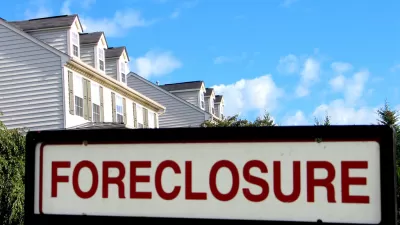Contracts for deed are gaining popularity at investment firms that scooped up swaths of foreclosed properties during the Great Recession. The risk for buyers, however, smacks of the same misdeeds that created that historic crisis in the first place.

The editorial Board of The New York Times raises alarms about the growing prominence of contracts for deed—a Depression-era financial arrangement with roots in racist housing policy.
The editorial follows a recent report in The Times by Alexandra Stevenson and Matthew Goldstein, finding contracts for deed "increasingly being used by investment firms that have bought thousands of foreclosed homes and want to sell them to lower-income buyers 'as is,'" according to the editorial.
Contracts for deed make gouging possible, because unlike traditional mortgages, there is no appraisal or inspection to ensure that the loan amount is reasonable. They also let an investor swiftly evict buyers for missed payments, rather than giving them time to catch up, as required under a mortgage. And they usually require the buyer to pay hefty upfront fees. Unlike a rental security deposit, however, the fee is almost never refundable.
The editorial compares contracts for deed to the subprime loans of the housing bubble leading up to the Great Recession. After making it clear that contracts for deed only help investors, while "nearly always" inflicting harm for borrowers, the editorial calls for the Consumer Financial Protection Bureau to "assert its authority over these contracts…"
FULL STORY: The Racist Roots of a Way to Sell Homes

Trump Administration Could Effectively End Housing Voucher Program
Federal officials are eyeing major cuts to the Section 8 program that helps millions of low-income households pay rent.

Planetizen Federal Action Tracker
A weekly monitor of how Trump’s orders and actions are impacting planners and planning in America.

Ken Jennings Launches Transit Web Series
The Jeopardy champ wants you to ride public transit.

Congress Moves to End Reconnecting Communities and Related Grants
The House Transportation and Infrastructure Committee moved to rescind funding for the Neighborhood Equity and Access program, which funds highway removals, freeway caps, transit projects, pedestrian infrastructure, and more.

From Throughway to Public Space: Taking Back the American Street
How the Covid-19 pandemic taught us new ways to reclaim city streets from cars.

Opinion: Transit Agencies Must View Service Cuts as Last Resort
Reducing service could cripple transit systems by pushing more riders to consider car ownership, making future recovery even less certain.
Urban Design for Planners 1: Software Tools
This six-course series explores essential urban design concepts using open source software and equips planners with the tools they need to participate fully in the urban design process.
Planning for Universal Design
Learn the tools for implementing Universal Design in planning regulations.
Heyer Gruel & Associates PA
Ada County Highway District
Institute for Housing and Urban Development Studies (IHS)
City of Grandview
Harvard GSD Executive Education
Toledo-Lucas County Plan Commissions
Salt Lake City
NYU Wagner Graduate School of Public Service





























